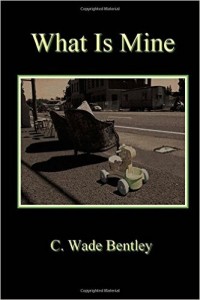 SUNDAY BLOG READ is your glimpse into the working minds and hearts of Utah’s literary writers. Each month, 15 Bytes offers works-in-progress and / or recently published work by some of the state’s most celebrated and promising writers of fiction, poetry, literary non-fiction and memoir.
SUNDAY BLOG READ is your glimpse into the working minds and hearts of Utah’s literary writers. Each month, 15 Bytes offers works-in-progress and / or recently published work by some of the state’s most celebrated and promising writers of fiction, poetry, literary non-fiction and memoir.
Today we are featuring Salt Lake City-based poet C. Wade Bentley who here provides four poems, two published, and two works-in-progress, ranging from one about poetry itself to the winter scene of wildlife–“a trope that will let this still-life with bowl/of deer develop some redolent fust and decay.”
For this self-described “incorrigible introvert,” Wade describes poetry as the language with which he is comfortable “when I want to attempt to say something real to the other humans. In that way,” he continues, the form “has saved me from a life of atrophy, muteness, and isolation. I’m not one who believes poetry can save the world, nor that it needs to be evangelized. The world has too much religion. But poetry can save the poet, occasionally. I bear my testimony of that. Amen.”
15 Bytes has earlier reviewed Bentley’s work, describing how he “tells stories of abandonment in his poems with simplicity and elegance and treats both the need to escape and the pain of rejection with equal compassion.” (You can read the full review of his 2013 chapbook Askew here.) His full collection What is Mine (Aldrich Press), was published in January of last year.
So curl up with your favorite cup of Joe, and enjoy the work of Wade Bentley!
*
Not That You Asked
No one is asking for another poem. When I walk
the neighborhood, no one stops me to ask
why I haven’t shared with them my latest thoughts
on death, or dogs, or the way a flatworm swordfights
with his penis. There are no petitions, no Kickstarter
fundraisers, not even a peaceful march with placards
and animated crowds asking in a shout, “When
do we want it?” Anyway, the answer would be,
I’m quite certain, “We’re good. No hurry, dude. Whatever
works for you.” It’s okay. I get it. Poets are like
that lady in your office who always wants to tell people
her dreams: “There is no word in the world
to describe the color of the shirt Ryan Reynolds
took off before he kissed me. But then I realized
it was my father I was kissing! Don’t even get me
started on what that might mean.” And no one does
get her started, but that doesn’t stop her. Point taken.
I won’t be saddling any of you with how it felt
this afternoon to find, as I was boxing up my old books
from college, sandwiched between the pages
of Herbert’s “Bitter-sweet” and “Love,” between
“sour-sweet days” and “usurping lust,” a condom
wrapped in a square of red foil, as yet unope’d.
(appeared in Pembroke Magazine, 2016)
*
The Strong Force
My father had begun to suspect that things were no longer
what they seemed to be. This was not your garden-variety,
tinfoil-hat, alien-probe paranoia. Nor had his mind taken on
the protective coating of dementia, none of the Swiss-cheesing
of the brain that might have deflated him into dispassion.
If anything, his senses were now increasingly aware
of the ground becoming less firm beneath his feet, as if
one could no longer count on the quarks to link their tiny
hands and bind up all the empty spaces with chromodynamics
and baling wire. It was Death he saw coming, of course, close
enough now to hear the folds of the black cloak whispering
past him at night, smell the carrion on His breath.
This was not the abstraction against which he had stockpiled
faith for eighty years, testifying when he was younger that death
held no fear for him. Just yesterday, when we saw a junco
pulling at the decay of a fallen spruce, early light turning the orange
of the tree and the white-tipped tail feathers of the bird to fire,
he asked me how he could be expected to let any of it go,
to just move on, and I knew he meant that, whatever might be
ahead, it seemed incredible now, impossible to believe
it could ever atone for all he would soon leave behind.
(appeared in The Timberline Review, 2015)
*
Building Up the Kingdom
Some Saturdays Dad hauled me early
out of bed to help build the new church.
He said it would help me appreciate it
more, make me feel like I had a stake
in it. At first the work involved hod
carrying for the masons, picking up
loose nails, putting scraps of wood
into the barrels for burning. But then
they began to give me increasingly
complex tasks, jobs that required some
actual skill and acumen: hammering
electrical boxes into the studs, running
wire, drilling holes for plumbing lines.
Instruction consisted of, “Like this, kid.”
It might be better for a kid not to know
what goes on behind the scenes, behind
the dry wall and insulation and mortar.
Better he thinks God was the foreman
and angels supervised the consistency of cement,
the whole level-and-plumb of things.
I only know that when I sat in that church
for meetings, some months later, I sat
in the pew furthest from the section of roof
sheathing I had helped lay, and that it was not,
in fact, piety that had me always looking up.
*
Browse
I wanted to write about the deer who slip
into my yard most winter nights to nibble
on the aspen and flowering plum, but is it
enough to simply say how beautiful they are—
yada, yada—those grey ghosts with their long
dark tongues? They are, it must be said, stripping
the bark and tender twigs, so I know
the aspens will be bare of leaves, come spring,
at least as far up as the reach of a deer,
and the plums are young enough they might
not survive this grazing and girdling. Still,
it’s not as if the deer are packing on the fat,
dimpled gluttons who delight in gorging
on the horticultural efforts of this new
neighborhood carved from the foothills.
No, when the security lights come on, the deer
are too exhausted from the months of mostly
fruitless foraging to do more than rotate
their ears and flash their bright eyes, while I
note each rib cage with its ribs like a stove-
in boat. I know I should adopt a tone, here,
a trope that will let this still-life with bowl
of deer develop some redolent fust and decay,
but I am distracted, at the moment, by a ruffle
of snow falling from the powerline to crown
a yearling doe who merely shakes her mule-ish
ears and capers, briefly, like a mythical faun,
perhaps, before nosing her mother’s neck.
#
Copyright by C. Wade Bentley
 C. Wade Bentley lives, teaches, and writes in Salt Lake City. For a good time, he enjoys wandering the Wasatch Mountains and playing with his grandchildren. His poems have appeared in Green Mountains Review, Cimarron Review, Best New Poets, New Ohio Review, Western Humanities Review, Rattle, Chicago Quarterly Review, Timberline Review, Reunion: The Dallas Review, Pembroke Magazine, and New Orleans Review, among others. A full-length collection of his poems, What Is Mine, was published by Aldrich Press in January of 2015.
C. Wade Bentley lives, teaches, and writes in Salt Lake City. For a good time, he enjoys wandering the Wasatch Mountains and playing with his grandchildren. His poems have appeared in Green Mountains Review, Cimarron Review, Best New Poets, New Ohio Review, Western Humanities Review, Rattle, Chicago Quarterly Review, Timberline Review, Reunion: The Dallas Review, Pembroke Magazine, and New Orleans Review, among others. A full-length collection of his poems, What Is Mine, was published by Aldrich Press in January of 2015.
Past featured writers in 15 Bytes’ Sunday Blog Read: Katharine Coles, Michael McLane, Darrell Spencer,Larry Menlove,Christopher Bigelow, Shanan Ballam,Steve Proskauer, April Wilder,Calvin Haul, Lance Larsen,Joel Long,Lynn Kilpatrick,Phyllis Barber, David Hawkins,Nancy Takacs,Mike Dorrell,Susan Elizabeth Howe, Star Coulbrooke, Brad Roghaar,Jerry Vanleperen,Maximilian Werner, Markay Brown, Natalie Young, Michael Sowder, andDanielle Beazer Dubrasky, Kevin Holdsworth, Jacqueline Osherow, Stephen Carter, Alex Caldiero, Stephen Tuttle, Raphael Dagold, David Lee, Lisa Bickmore, Kirstin Scott, Jesse Parent, Craig Dworkin, Laura Stott, Jana Richman, and Melody Newey Johnson.

Join us on the first Sunday of every month for works-in-progress or recently published work by some of Utah’s most celebrated and promising writers of fiction, poetry, literary nonfiction and memoir. Click “Subscribe” at the top of our page to join our email list.
Categories: Daily Bytes | Literary Arts | READ LOCAL First







Delicious, clean, strong work infused with humor. I am asking for another poem.
Wade Bentley’s poems bless us with wit and bathe us in story. Just the best.